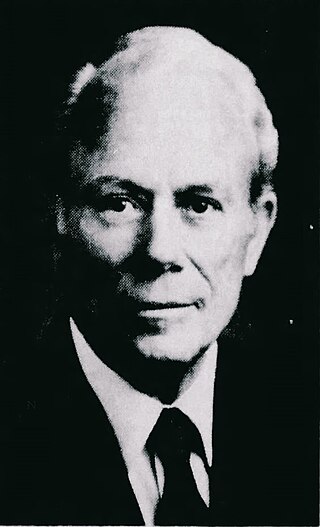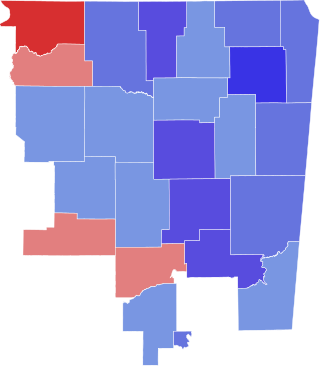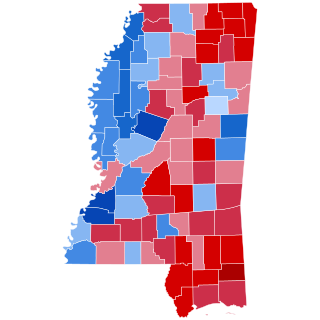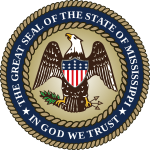
David Ronald Musgrove is an American lawyer and politician who served as the 62nd governor of Mississippi from 2000 to 2004. A Democrat, he previously served as the 29th lieutenant governor of Mississippi from 1996 to 2000. He was the Democratic nominee in the 2008 special election for one of Mississippi's seats in the United States Senate, losing to incumbent Senator Roger Wicker. Musgrove is a principal at a public affairs consulting firm, Politics. In 2014, he became founding partner of a new law firm in Jackson, Mississippi, Musgrove/Smith Law. As of 2024, he is the most recent Democrat to hold the office of Governor of Mississippi.

Daniel Kirkwood "Kirk" Fordice Jr. was an American politician and businessman who served as the 61st governor of Mississippi from 1992 to 2000. He was the first Republican governor of the state since Reconstruction, and the state's first governor elected to two consecutive four-year terms.

Haley Reeves Barbour is an American attorney, politician, and lobbyist who served as the 63rd governor of Mississippi from 2004 to 2012. A member of the Republican Party, he previously served as chairman of the Republican National Committee from 1993 to 1997.

The Mississippi Republican Party is the Mississippi state affiliate of the United States Republican Party. The party chairman is Frank Bordeaux, and the party is based in Jackson, Mississippi. The original Republican Party of Mississippi was founded following the American Civil War, and the current incarnation of the Mississippi Republican Party was founded in 1956. The party would grow in popularity after the 1964 Civil Rights Act and is currently the dominant party in the state.

United States gubernatorial elections were held in October and November 2007 in three states. The final results were a net change of zero among the parties. Republicans picked up the open seat in Louisiana and reelected incumbent Haley Barbour in Mississippi, while Democrats defeated Republican incumbent Ernie Fletcher in Kentucky.

The 2002 California gubernatorial election was an election that occurred on November 5, 2002. Gray Davis, a Democrat and the incumbent governor of California, defeated the Republican challenger Bill Simon by 5% and was re-elected to a second four-year term. Davis would be recalled less than a year into his next term.

The 2007 Mississippi gubernatorial election was held on Tuesday, November 6. Incumbent Haley Barbour was re-elected to serve a four-year term as governor of Mississippi from January 15, 2008, through January 10, 2012. The Lieutenant Governor of Mississippi is also on the ballot and elected for the same time period. This was the first time that Panola County and Yalobusha County voted Republican for governor since Reconstruction.

United States gubernatorial elections were held in four states. Kentucky and Mississippi held their general elections on November 4. Louisiana held the first round of its jungle primary on October 4 and the runoff on November 15. In addition, California held a recall election on October 7.

The 2010 South Carolina gubernatorial election took place on November 2, 2010. Incumbent Republican Governor Mark Sanford was term limited and unable to seek re-election. Primary elections took place on June 8, 2010, and a runoff election, as was necessary on the Republican side, was held two weeks later on June 22.

John Arthur Eaves Jr. is an American attorney and politician. He was the unsuccessful Democratic Party nominee in the 2007 general election for Governor of Mississippi.

The 2008 Mississippi 1st congressional district special election was a special election in the state of Mississippi to determine who would serve the remainder of former Representative Roger Wicker's term. After an April 22, 2008 ballot resulted in no candidate receiving a majority, Democratic Party candidate Travis Childers defeated Republican candidate Greg Davis in a runoff election on May 13, 2008.

The 2008 United States Senate special election in Mississippi was held on November 4, 2008. This election was held on the same day of Thad Cochran's re-election bid in the regularly scheduled Class II election. The winner of this special election served the rest of the Senate term, which ended in January 2013. Unlike most Senate elections, this was a non-partisan election in which the candidate who got a majority of the vote won, and if the first-place candidate did not get 50%, a runoff election with the top two candidates would have been held. In the election, no run-off was necessary as Republican nominee and incumbent Republican U.S. Senator Roger Wicker won election to finish the term.

The 2003 Kentucky gubernatorial election was held to elect the Governor of Kentucky on November 4, 2003. Republican candidate Ernie Fletcher defeated Democrat Ben Chandler and became the first Republican governor of Kentucky in 36 years.

The 2008 United States presidential election in Mississippi took place on November 4, 2008, and was part of the 2008 United States presidential election. Voters chose 6 representatives, or electors to the Electoral College, who voted for president and vice president.

The Government of Mississippi is the government of the U.S. state of Mississippi. Power in Mississippi's government is distributed by the state's Constitution between the executive and legislative branches. The state's current governor is Tate Reeves. The Mississippi Legislature consists of the House of Representatives and Senate. Mississippi is one of only five states that elects its state officials in odd numbered years. Mississippi holds elections for these offices every four years in the years preceding Presidential election years.

The 2011 Mississippi gubernatorial election was held on November 8, 2011. Incumbent Republican Governor of Mississippi Haley Barbour was unable to run for a third term due to term limits.

The 1980 United States presidential election in Mississippi took place on November 4, 1980. All fifty states and The District of Columbia were part of the 1980 United States presidential election. Mississippi voters chose seven electors to the Electoral College, who voted for president and vice president.

United States gubernatorial elections were held on November 5, 2019, in Kentucky and Mississippi, and on October 12, 2019, with a runoff on November 16, in Louisiana. These elections formed part of the 2019 United States elections. The last regular gubernatorial elections for all three states were in 2015. The Democrats had to defend an incumbent in Louisiana, while the Republicans had to defend an incumbent in Kentucky plus an open seat in Mississippi. Though all three seats up were in typically Republican states, the election cycle became unexpectedly competitive: Kentucky and Louisiana were seen as highly contested races; and Mississippi's race ultimately became closer than usual, despite being seen as favorable for the Republicans.

The 2019 Mississippi gubernatorial election took place on November 5, 2019, to choose the next governor of Mississippi. Incumbent Governor Phil Bryant was ineligible to run for a third term due to term limits. The Democratic Party nominated incumbent Attorney General Jim Hood, the only Democrat holding statewide office in Mississippi; the Republican Party nominated incumbent Lieutenant Governor Tate Reeves. In the general election, Reeves defeated Hood by a margin of 5.08%, with Reeves significantly underperforming Donald Trump, who won the state by 17 points in 2016.

The 2023 Mississippi gubernatorial election was held on November 7, 2023, to elect the governor of Mississippi. Incumbent Republican governor Tate Reeves won re-election to a second term, defeating Democratic nominee, Public Service Commissioner Brandon Presley.























